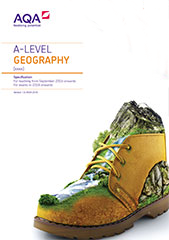3.3.2.1 Independence
Some stages of the investigation must be carried out independently. Other parts of the investigation may be carried out collaboratively, either as a class, group or pair.
Independence is compulsory in the following stages of the investigation:
- defining and developing a question or issue to address aims, questions and/or hypotheses relating to any aspect of the specification
- drawing on research, including field data and if relevant, secondary data which must be sourced by the student
- contextualising, analysing and summarising findings and data
- presenting data and drawing conclusions.
Collaboration is allowed in the following stages of the investigation:
- exploring the focus of potential investigations
- collecting field data and/or evidence from field investigations.
If students collaborate where independence is expected then the teacher must record this additional assistance on the Candidate record form (CRF) and take it into account when marking the work. You must award a mark which reflects the student’s unaided achievement. Failure to do so will be considered as malpractice. If malpractice is suspected, we will investigate. If malpractice is found to have taken place a penalty will be given dependent on the circumstances and severity of the malpractice. For full information, please see Malpractice and the JCQ instructions Suspected Malpractice in Examinations and Assessment.
Students should select a manageable focus for their investigation which enables them to select one or more specific research question(s) or issue(s) with both a theoretical basis and a locational context. Appropriate and feasible methods should be used to collect relevant data. The data collected should permit the use of appropriate cartographical, graphical and statistical skills to enable a full interpretation to be made, which should include reference to the title/aim. The conclusion should include a summary of the results, the relevance of these to the title/aim and an evaluation of the overall investigation, including the contributions and limitations of geography in understanding the topic and opportunities for further research.
Preparation must involve enquiry work outside the classroom, to include data collection in the field and might include, for example, data collected in specialist study venues, work experience settings, internet research and use of library or archive.
Students are expected to submit a written report which is 3,000–4,000 words in length. This includes all text, text boxes and supplementary material such as photographs and data presentation techniques. It does not include appendices. When attaching appendices students should have examples of raw data only, such as data sheets and questionnaires, rather than every questionnaire completed.
Students who offer work that is below the advisory word count may be penalising themselves by not allowing appropriate coverage of the required assessment objectives. Students who exceed the advisory word count may be penalising themselves through a lack of precision and focus.
